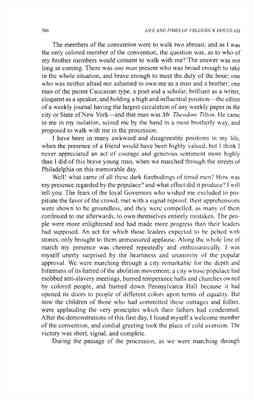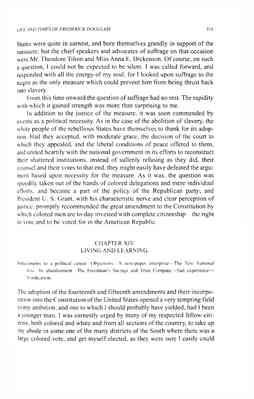Pages That Mention Tilton, Theodore
Life and Times, Second Part
154
306
LIFE AND TIMES OF FREDERICK DOUGLASS
The members of the convention were to walk two abreast, and as I was the only colored member of the convention, the question was, as to who of my brother members would consent to walk with me? The answer was not long in coming. There was one man present who was broad enough to take in the whole situation, and brave enough to meet the duty of the hour: one who was neither afraid nor ashamed to own me as a man and a brother: one man of the purest Caucasian type, a poet and a scholar, brilliant as a writer, eloquent as a speaker, and holding a high and influential position- the editor of a weekly journal having the largest circulation of any weekly paper in the city or State of New York-and that man was Mr. Theodore Tilton. He came to me in my isolation, seized me by the hand in a most brotherly way, and proposed to walk with me in the procession .
I have been in many awkward and disagreeable positions in my life. when the presence of a friend would have been highly valued, but I think I never appreciated an act of courage and generous sentiment more highly than I did of this brave young man, when we marched through the streets of Philadelphia on this memorable day.
Well! what came of all these dark forebodings of timid men'? How was my presence regarded by the populace? and what effect did it produce? I will tell you. The fears of the loyal Governors who wished me excluded to propitiate the favor of the crowd, met with a signal reproof, their apprehensions were shown to be groundless, and they were compelled, as many of them confessed to me afterwards, to own themselves entirely mistaken . The people were more enlightened and had made more progress than their leaders had supposed. An act for which those leaders expected to be pelted with stones, only brought to them unmeasured applause. Along the whole line of march my presence was cheered repeatedly and enthusiastically. I was myself utterly surprised by the heartiness and unanimity of the popular approval. We were marching through a city remarkable for the depth and bitterness of its hatred of the abolition movement: a city whose populace had mobbed anti-slavery meetings, burned temperance halls and churches owned by colored people, and burned down Pennsylvania Hall because it had opened its doors to people of different colors upon terms of equality. But now the children of those who had committed these outrages and follies' were applauding the very principles which their fathers had condemned. After the demonstrations of this first day, I found myself a welcome member of the convention, and cordial greeting took the place of cold aversion. The victory was short, signal, and complete.
During the passage of the procession, as we were marching through
159
LIFE AND TIMES OF FREDERICK DOUGLASS 311
States were quite in earnest, and bore themselves grandly in support of the measure; but the chief speakers and advocates of suffrage on that occasion were Mr. Theodore Tilton and Miss Anna E. Dickenson. Of course, on such a question, I could not be expected to be silent. I was called forward, and responded with all the energy of my soul, for I looked upon suffrage to the negro as the only measure which could prevent him from being thrust back into slavery.
From this time onward the question of suffrage had no rest. The rapidity with which it gained strength was more than surprising to me.
In addition to the justice of the measure, it was soon commended by events as a political necessity. As in the case of the abolition of slavery, the white people of the rebellious States have themselves to thank for its adoption. Had they accepted, with moderate grace, the decision of the court to which they appealed, and the liberal conditions of peace offered to them, and united heartily with the national government in its efforts to reconstruct their shattered institutions, instead of sullenly refusing as they did, their counsel and their votes to that end, they might easily have defeated the argument based upon necessity for the measure. As it was, the question was speedily taken out of the hands of colored delegations and mere individual efforts, and became a part of the policy of the Republican party; and President U. S. Grant, with his characteristic nerve and clear perception of justice, promptly recommended the great amendment to the Constitution by which colored men are to-day invested with complete citizenship—the right to vote and to be voted for in the American Republic.
CHAPTER XIV. LIVING AND LEARNING.
Inducements to a political career — Objections — A newspaper enterprise — The New National Era — Its abandonment — The Freedman's Savings and Trust Company — Sad experience — Vindication
The adoption of the fourteenth and fifteenth amendments and their incorporation into the Constitution of the United States opened a very tempting field to my ambition, and one to which I should probably have yielded, had I been a younger man. I was earnestly urged by many of my respected fellow-citizens, both colored and white and from all sections of the country, to take up my abode in some one of the many districts of the South where there was a large colored vote, and get myself elected, as they were sure I easily could

